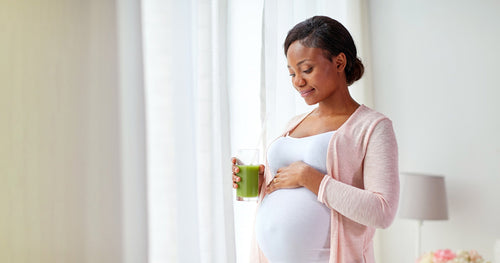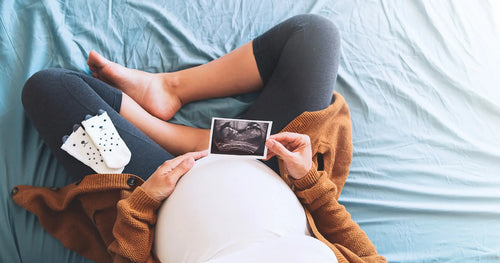
There’s a baby on the way? That’s fabulous news, congratulations. What a happy and exciting time. Naturally there are so many plans to be made, but while you are busy picking out names and planning the nursery, don’t forget to pay special attention to mom and baby’s nutrition.
The Most Important Vitamins for Baby and Mom
Ideally, the time to start eating healthy is before pregnancy. Expectant mothers want to be sure they're eating the best foods to support the developing baby, like a variety of vegetables, fruits, whole grains, legumes, fat-free or low-fat dairy products, and protein foods. Cold water fish, like salmon and tuna, supply protein and the beneficial omega-3s EPA and DHA. Choose foods and drinks with less added sugars, saturated fats, and sodium (salt). Limit refined grains and starches, which are in processed foods like cookies, white bread, and some snack foods. Keep caffeine to a maximum of 200 mg per day. This is equivalent to two 6-oz. cups of coffee.
Nutrients that deserve special mention for supporting a healthy pregnancy include fiber from fruits, vegetables, legumes, and whole grains. Fiber promotes a healthy weight and blood sugar levels. Folate is important for the development of the baby’s nervous system and spine. Women of childbearing age should take a multivitamin daily that provides 400 mcg of folate. Once a woman decides to try to get pregnant, she should switch to a prenatal formula or folic acid supplement that provides 800 mcg of folic acid.
The omega-3 DHA is another important nutrient for a healthy pregnancy and throughout the breastfeeding period. It supports healthy brain, vision, and nervous system development for babies and a healthy mood for moms. A new study shows pregnant women who get at least 1,000 mg of DHA daily reduce their risk of early pre-term birth. Note that this is well above the typically recommended 200 mg dose. The study mentions that women should get a higher level of DHA from week 20 on.
Choline is another nutrient that's needed for proper development of the nervous system, healthy cell membranes, and healthy gene expression. Choline is found in both animal and plant source foods; however, animal source foods typically contain more choline per gram. Beef, eggs, chicken, fish, and pork are concentrated sources of choline. Among plant source foods, nuts, legumes, and cruciferous vegetables (e.g., broccoli) are relatively good sources. Choline is part of the family of B Complex vitamins and is found in some omega-3 supplements as well.
Calcium is important for supporting bone health. It's recommended women get 1,000 mg daily. Good sources of calcium include milk, cheese, yogurt, broccoli, kale, sardines, and orange juice that has calcium added to it. Three servings of food or drinks that contain calcium should equal about 1,000 mg of calcium. Women who feel they may not be getting enough servings of calcium-rich foods can take a supplement.
Iron is a mineral our body uses to make hemoglobin, a protein that helps carry oxygen from our lungs to the rest of our body. It's recommended women get 15 - 18 mcg of iron daily. When pregnant, women need twice as much - 27 mcg. Most prenatal vitamins will provide the recommended about of iron. Iron in the glycinate chelate form is easiest on sensitive stomachs.
Vitamin D3 support healthy bones, teeth, and growth and development. All women, including pregnant women, need a minimum of 600 international units (IUs) (15 mcg) of vitamin D3 daily. Some people need 2,000 to 4,000 IU (50 to 100 mcg) daily to maintain levels within the normal range. Checking vitamin D3 levels with a simple at-home test can help mom decide if she is getting enough vitamin D. Good sources are fatty fish like salmon and D-fortified items like milk and cereal.
Zinc supports healthy growth and development. It's recommended women get 8 mg while trying to conceive and 11 mg during pregnancy.
Prenatal vitamins are multivitamins made especially for pregnant women. Compared with a regular multivitamin, they provide more of the specific nutrients women need during pregnancy. Ideally, a woman should start taking prenatal vitamins before she gets pregnant.





